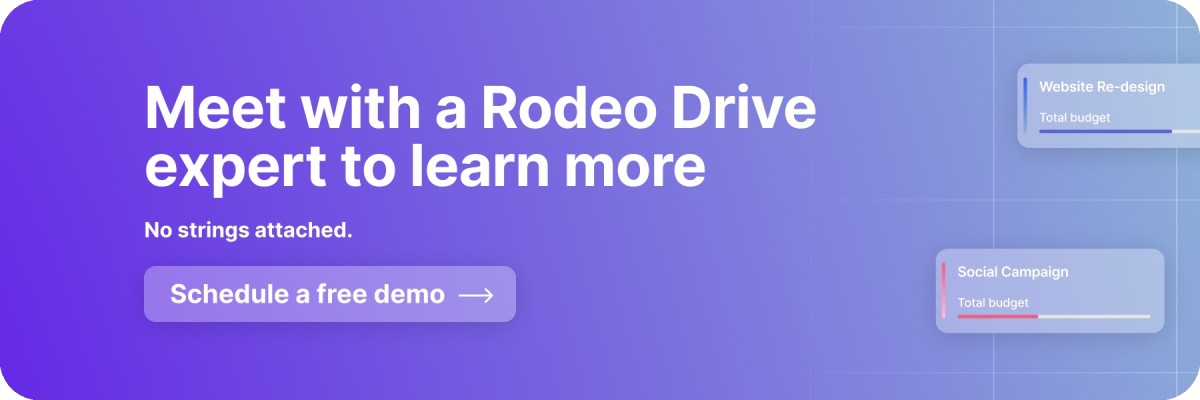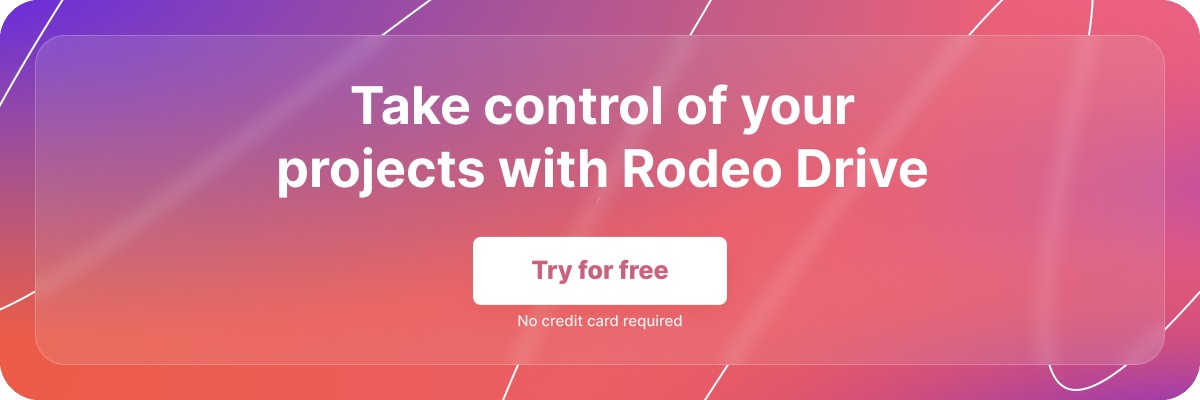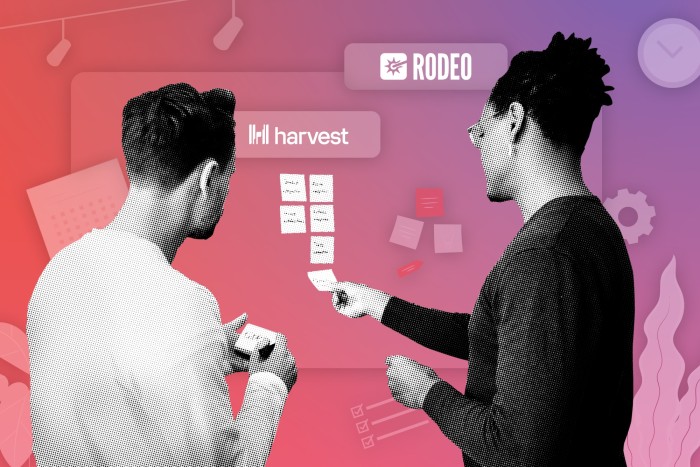Looking For TimeCamp Alternatives? Here Are The Top 16 Tools for 2024
TimeCamp is a popular time-tracking software that many companies use to track billable hours and oversee employee productivity.
However, this doesn’t mean all teams find it's a good fit for their time-tracking needs. Some teams require a greater focus on productivity management, whereas others need more robust project management features.
In this blog, we’ll introduce you to the complete range of options when it comes to TimeCamp alternatives. This way, you can be certain you’re choosing the tool that’s best suited to your team’s work style.
Why should I look for a TimeCamp alternative?
If your team is still evaluating TimeCamp as a potential software solution, you’ll want to see what former users on software review sites like Capterra and G2 are saying about it before committing.
We’ve compiled the top three issues users reported in their reviews to help you evaluate whether these might be dealbreakers that steer your team in the direction of a different tool.
Unreliable time features
Because TimeCamp is a tool primarily focused on time management, you’d expect it to have top-notch time-tracking capabilities. However, some users have found TimeCamp’s timer feature to be unreliable, which can pose issues when you’re relying on accurate data for client billing.
Here’s a look at one review from Capterra:
“Unreliable stopwatch!! TimeCamp needs to realise that this is a core feature that NEEDS TO WORK 99.9999% of the time, not 93% - it is no fun trying to correct the time sheet when you see grossly incorrect duration times.”
Limited project management features
As its name suggests, TimeCamp specializes in time management features. However, teams in need of other project management features might find that the tool falls short.
While the tool does offer features like budgeting and invoicing, some find these capabilities to be too bare-bones, including this G2 reviewer:
“(I dislike the) minimal feature set, the product should have much more with regards to feature set and actual project management rather than just time tracking.”
Lacking customer support
When trusting a software tool to help your team get their work done, you’ll want a platform that offers support whenever you encounter bumps in the road. Unfortunately, several TimeCamp users have found the tool’s customer service to be less than satisfactory. Like the following reviewer in G2:
“Customer service, based on our experience, has not been responsive enough.”
Or the following review, which was left on Capterra:
“(I dislike) their customer service. They kept replying to tickets that they had already closed and would continually push off the real issue. I couldn't even get my last month's charges refunded.”
16 TimeCamp alternatives to consider for 2024
There are many great time tracking software on the market in 2024, the question is which one is right for your team. Some offer only basic time-tracking features, whereas others take things a step further with more project management features.
Here’s our roundup of the top 16 TimeCamp alternatives out there.
1. Rodeo Drive
While it might seem biased that we put our project management software first on this list, hear us out.
Rodeo Drive is a financials-focused platform with all the features you need to guarantee profitable and successful projects. This includes time tracking, budgeting, invoicing, reporting, and more.
With an array of features at your fingertips, you’ll have everything you need to manage your projects from start to finish. Let’s take a closer look at the key features Rodeo Drive has to offer:
Time tracking in multiple ways
TimeCamp’s main value proposition is its ability to help with time tracking, allowing you to monitor your team’s time efficiency and optimize team performance in the process.
Rodeo Drive offers many of the same features, with the ability to track time by either starting a live timer when you start working or by adding a timecard after the fact. Every time entry needs to be assigned to a project activity or other activity — such as internal meetings or sick days — to guarantee that the number of billable hours you’re recording is correct.
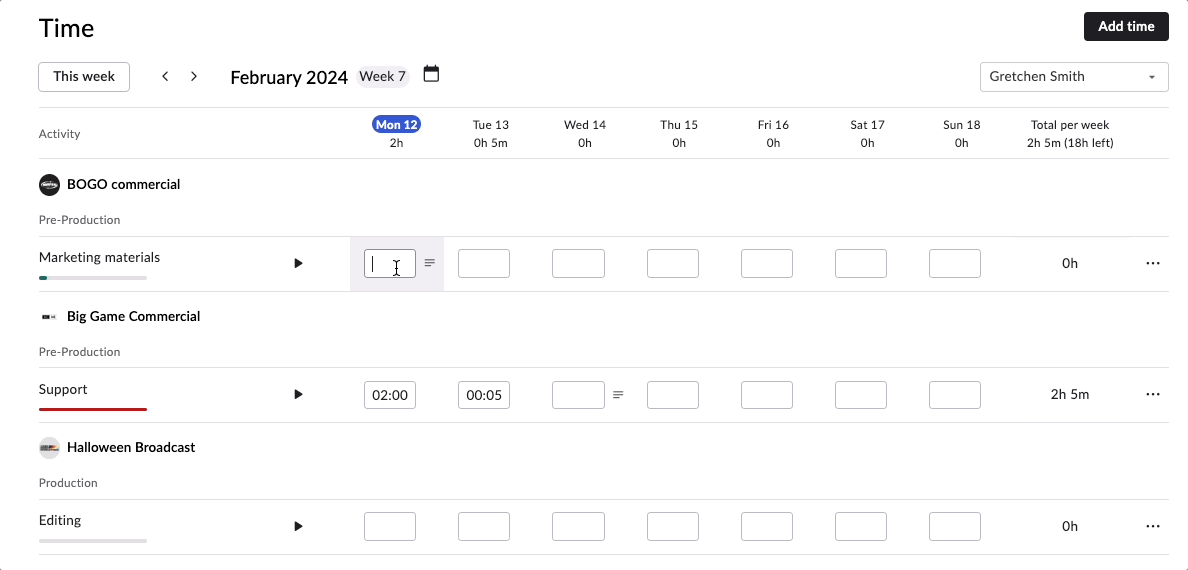
Recording time to a time card in Rodeo Drive is simple and easy
Once that time has been added to Rodeo Drive, getting paid for it is easy. Rodeo Drive integrates with QuickBooks for a seamless invoicing experience in the US, or you can invoice directly from Rodeo Drive in the UK.
Financial management features that connect with your time entries
The best part of tracking time in Rodeo Drive is that the value of your team’s time is automatically reflected in your budget spending, based on the hourly rate of each team member.
This means you’ll have an at-a-glance understanding of your project spending in real-time as your team works. So, if a project task takes longer than expected, you can immediately understand how this impacts your budget. How easy is that?

Your budget will automatically update to reflect your spending on project activities
Plus, you’ll find additional metrics on your project’s financial performance within Rodeo Drive’s reports. For example, your Projects report will depict your gross profit margin as well as an overview of the resources you still have available.
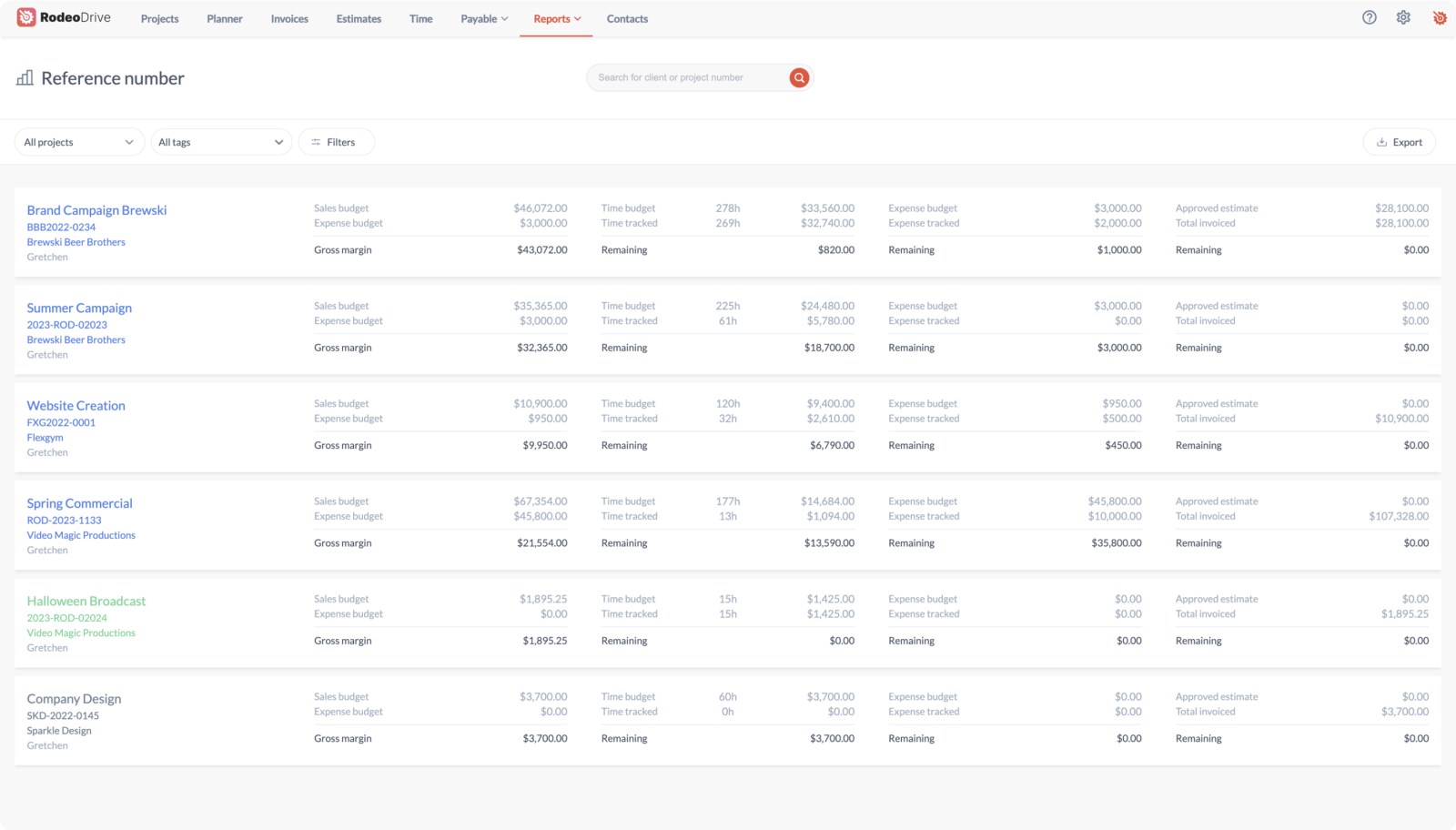
Your Projects report provides additional insights into your team’s financial performance
Immediate live chat customer support
When you sign up for Rodeo Drive’s Achiever plan, you unlock unlimited access to Rodeo Drive’s live chat customer support feature.
This means you’ll receive help from a real-life Rodeo Drive expert whenever you need assistance. No more unresponsive customer support or lengthy delays whenever you have an urgent question that needs answering.
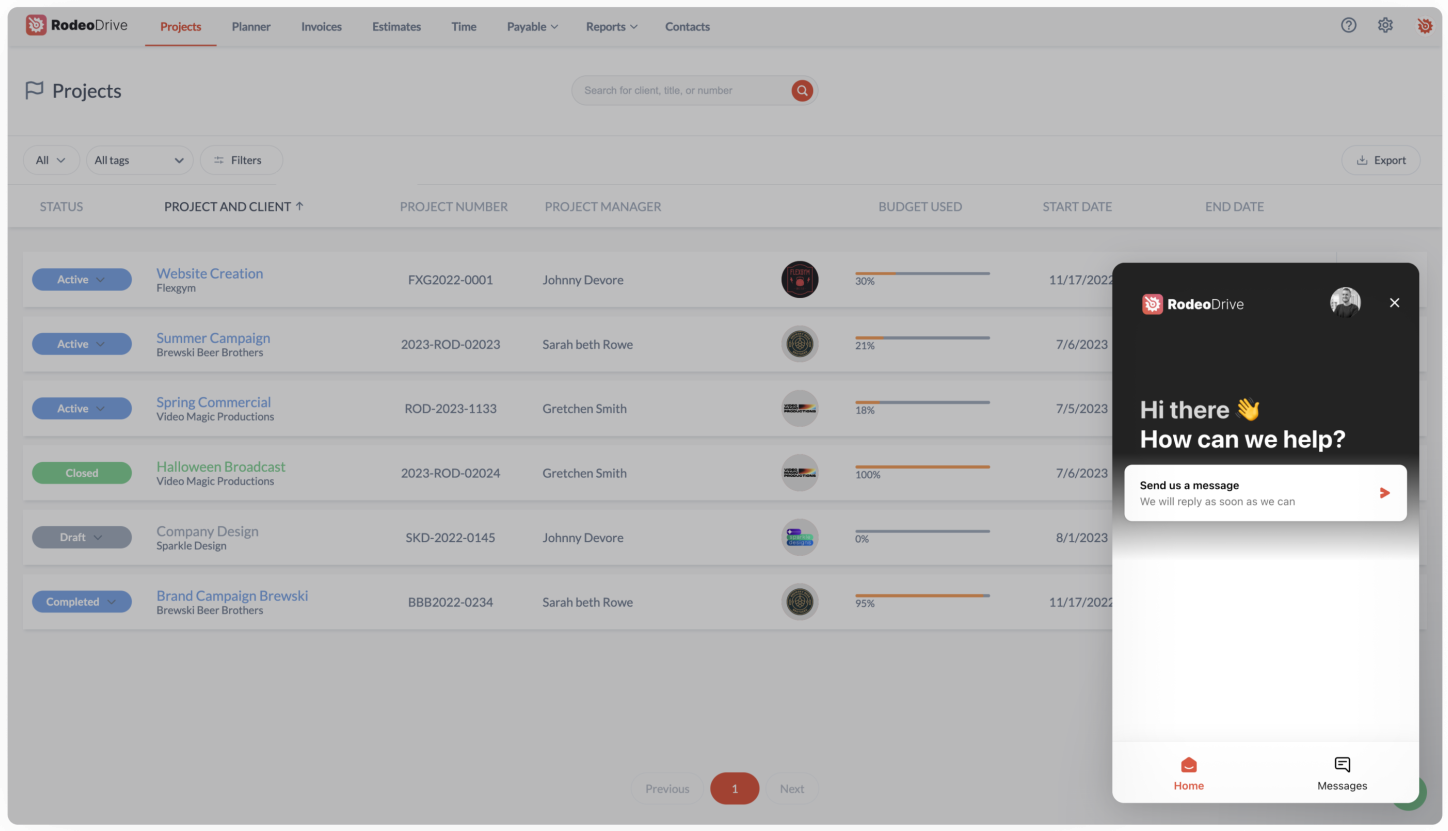
Rodeo Drive experts are always available within minutes via live chat support
Rodeo Drive’s additional features
Time tracking and financial management are just two of the many features Rodeo Drive has to offer. Here’s an overview of some of our other key features:
- Timeline-view activity and capacity planner: Prevent burnout and manage workloads by assigning project activities based on what’s already on your team’s plate using Rodeo Drive’s planner.
- Send customizable estimates based on your budget: Easily send estimates to potential clients based on the budget you create for their project. All estimates and invoices in Rodeo Drive are fully customizable.
- Centralize your project information: Keep your client and supplier information organized with Rodeo Drive’s contact management feature. This way, your signed agreements, rates, and markups are accessible in a single place.
- Free guest users: Want your client to have access to their project information? Users on the Achiever plan have unlimited free guest users so they’re always up to date on their project’s latest progress.
Rodeo Drive’s weaknesses
Rodeo Drive does not currently offer a mobile app, although this is on our roadmap for the future. The platform also doesn’t offer certain visualization features, such as Gantt charts.
Rodeo Drive’s pricing
Rodeo Drive offers two different pricing plans. Users can sign up for the Free plan with a limited feature set, or enroll in the Achiever plan, which offers unlimited access to all features for $14.99 per user/month.
Here’s a look at how the two plans compare:
- Free plan: Up to 10 users and 3 active projects, budgeting, estimates and invoices (with Rodeo Drive’s branding), planner, contact management
- Achiever plan ($14.99 per user/month): Everything in the free plan, plus unlimited projects, team size, custom work schedules, in-depth reports, free guest access, removed Rodeo Drive branding, and live chat support
2. Paymo
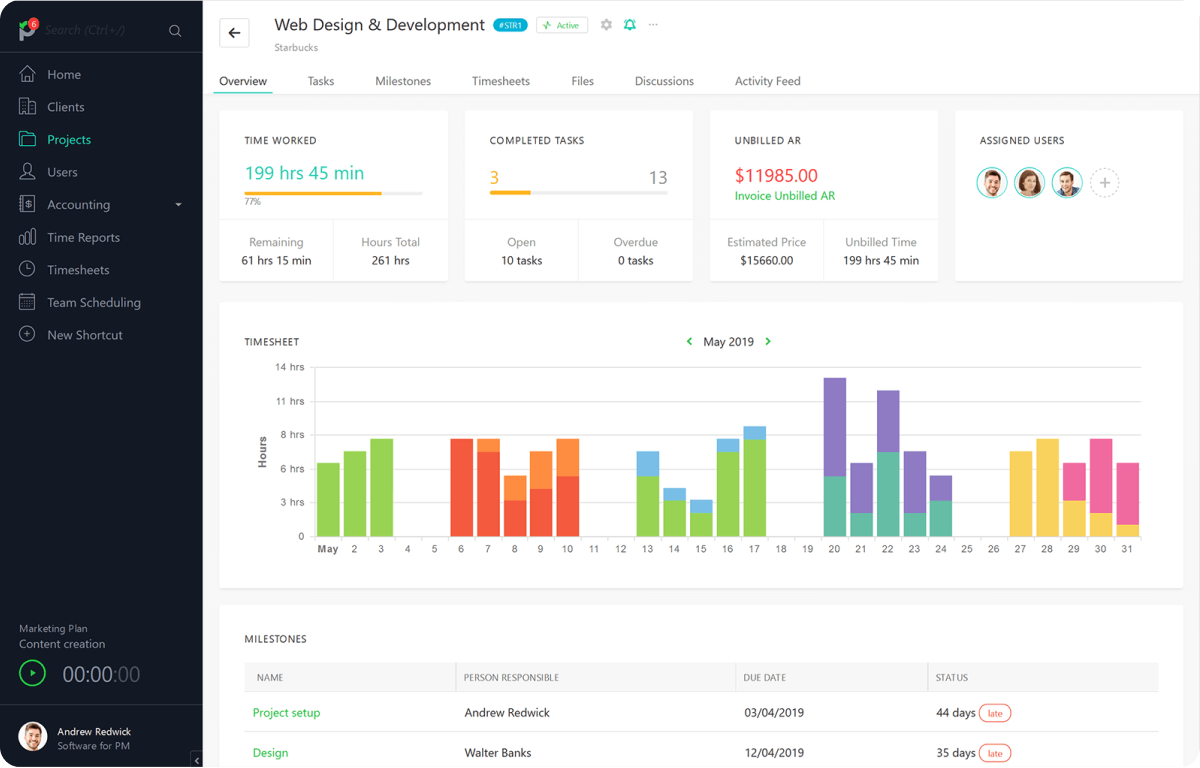
Source: Paymo
Paymo delivers a comprehensive project management solution for projects in many industries, including marketing agencies, engineering firms, and educational institutions.
The platform’s capabilities are relatively extensive, with time and task management, Kanban boards, online payments, and file proofing — to name just a few features. While Paymo is certainly more extensive than TimeCamp, it also offers time-centric features like automatic time tracking and a Pomodoro timer.
Also read: Paymo Alternatives: Top Competitors for Effective Project Management
Paymo popular features
- Automatic time tracking
- Team collaboration and scheduling
- Invoicing and estimates
- Online payments
Paymo weaknesses
Limited reporting options, poor invoicing capabilities, and an overly simple interface are all common complaints among online Paymo reviews. Notably, former users say the Paymo interface isn’t great for managing multiple projects at once, as the platform’s layout is easily cluttered.
Paymo pricing
- Free plan
- Starter plan: $9.90 per user/month
- Small office plan: $15.90 per user/month
- Business plan: $23.90 per user/month
3. Time Doctor
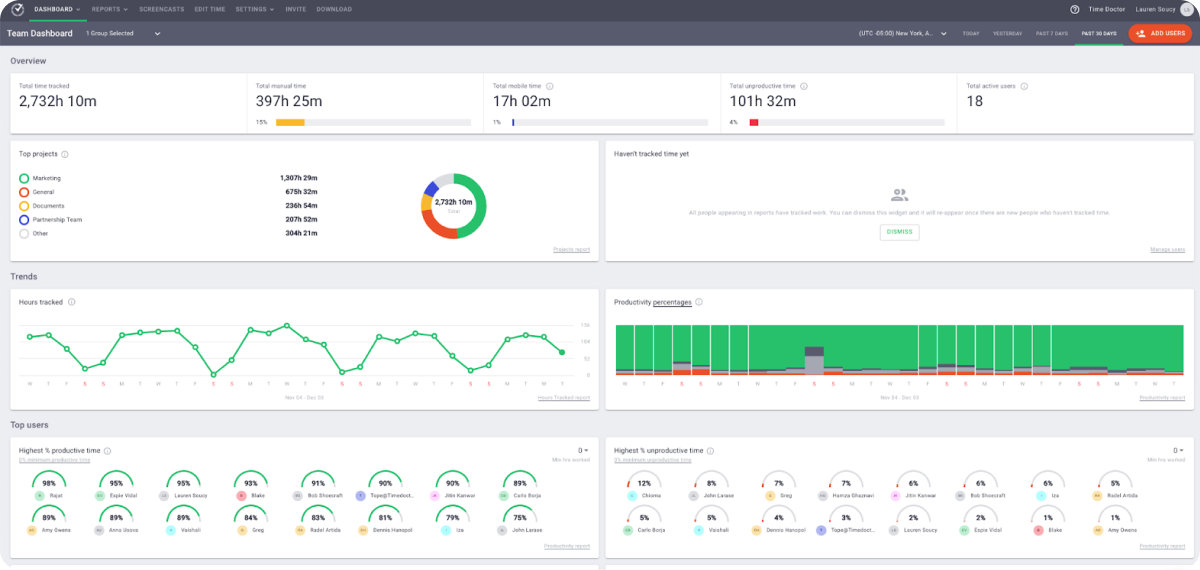
Source: Time Doctor
If you’re looking for a software solution with the same sort of productivity tracking capabilities as TimeCamp, then it might be worth considering Time Doctor.
Time Doctor specializes in employee monitoring, which includes an overview of your team’s activity, screen recording, and a log of each team member’s productive and non-productive work. Features like the internet connectivity report also help you understand if employees are facing connectivity issues that decrease productivity.
The platform also provides rather standard time management features, such as automated time tracking.
Time Doctor popular features
- Employee monitoring with screenshots
- Productivity reports
- Work schedules
- Offline and silent time tracking
Time Doctor weaknesses
Time Doctor has come under fire for its reputation as an employee spying tool. Many find its employee monitoring features to be an invasion of privacy and have said that using Time Doctor can make employees feel like management doesn’t trust them to get their work done.
Time Doctor pricing
- Basic plan: $7 per user/month
- Standard plan: $10 per user/month
- Premium plan: $20 per user/month
4. nTask
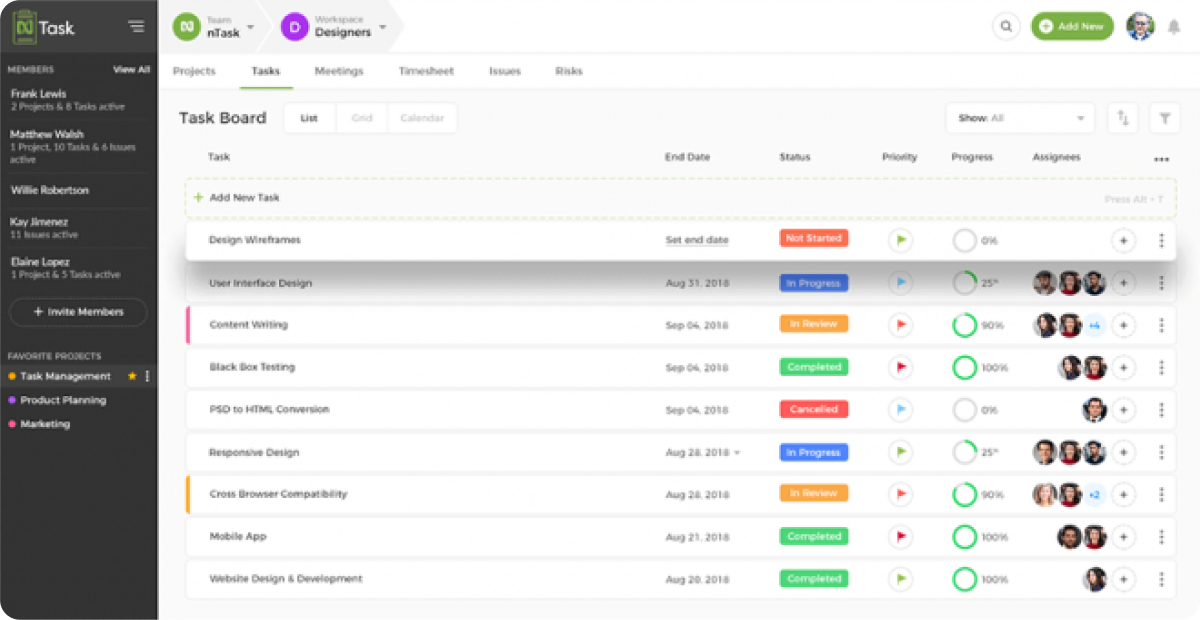
Source: nTask
nTask is a TimeCamp alternative built for teams looking for an all-in-one software solution that can cater to all of your project needs, on top of your time tracking requirements.
The platform stands out from other project management tools due to some of its more unique feature offerings, including meeting management, issue tracking, and risk management. That said, nTask might have too many features if you’re not looking for a super robust solution.
Related: nTask Alternatives: Your Guide to the Best Competitors
nTask popular features
- Task management
- Kanban board
- Timesheets
- Issue tracking
nTask weaknesses
nTask’s time-tracking abilities can be rather limited, especially for those looking to track time toward more minor project tasks. For example, there’s no actual stopwatch timer available within nTask, which can make logging time a drag for those who are frequently working on minor activities or switching between tasks.
nTask pricing
- Premium plan: $4 per user/month
- Business plan: $12 per user/month
- Enterprise plan: Contact for pricing
5. Harvest
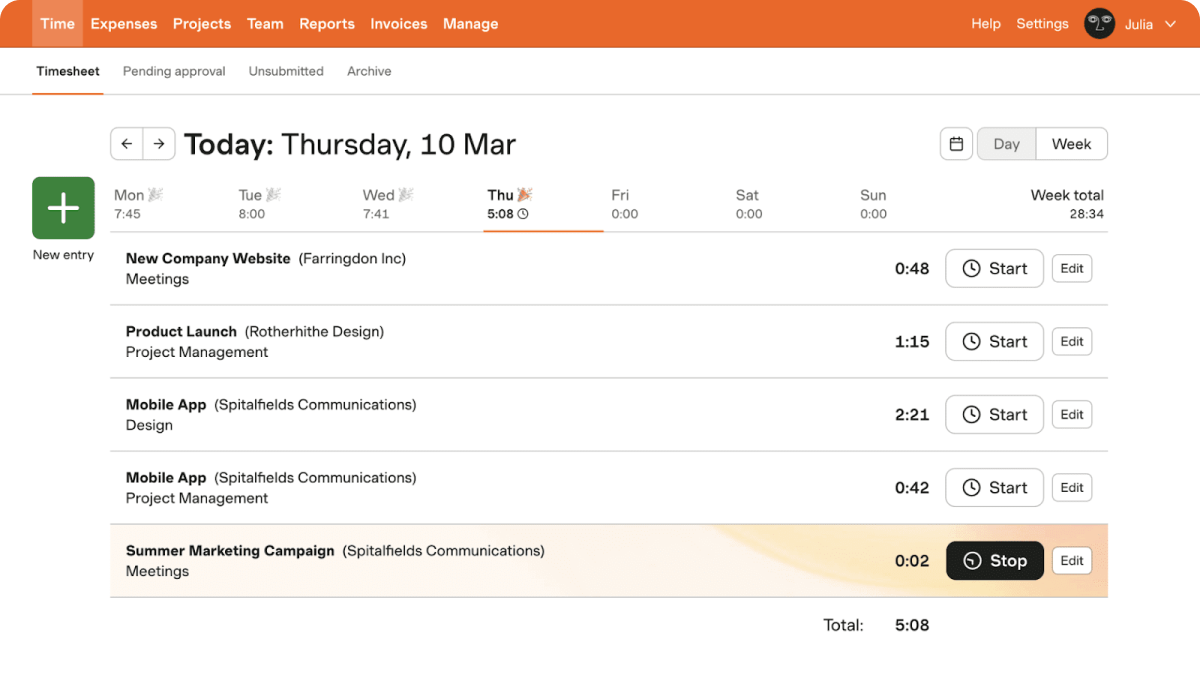
Source: Harvest
Among TimeCamp alternatives, Harvest is known as a simple and easy-to-use solution. The platform can be used in any industry where it’s important to record billable hours, from law firms to ad agencies and construction companies.
Harvest has three main capabilities: time tracking, reporting, and invoicing. Additionally, Harvest is helpful for teams that work on the go, as you can track time on Harvest’s desktop, web, and mobile apps.
Harvest popular features
- Time tracking reminders
- Reports and analysis
- Invoicing and payments
Harvest weaknesses
Harvest isn’t a very robust tool. Its primary purpose is time tracking, and reviews say its reporting and invoicing features aren’t particularly strong. This platform isn’t made for teams with complex project needs.
Harvest pricing
- Free plan
- Pro plan: $12 per user/month
6. Toggl Track
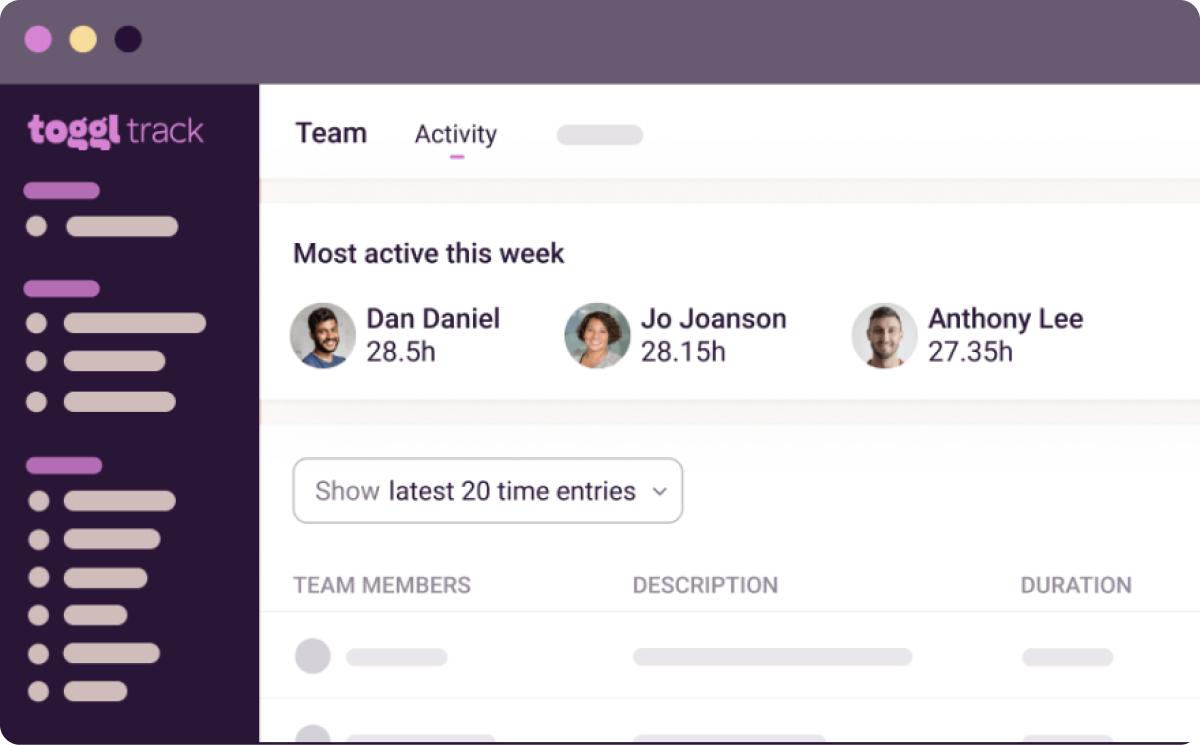
Source: Toggl Track
Toggl Track might be worth looking into for teams in need of lightweight time management features. Users can create timesheets, access detailed reports, invoice clients, and calculate payroll within the platform.
Should you need additional functionality, such as a project planner, you can purchase Toggl Plan as an additional product and integrate it with Toggl Track. Each product stands alone underneath the Toggl umbrella.
Toggl Track popular features
- Time tracking
- Reporting
- Billing and invoicing
- Payroll
Toggl Track weaknesses
Because Toggl Track relies on integrations to deliver a complete project management experience, it can be a more costly option than opting for an all-in-one tool. The reporting feature is also more basic than some users need.
Toggl Track pricing
- Free: For up to 5 users
- Starter: $10 per user/month
- Premium: $20 per user/month
- Enterprise: Custom pricing
7. ClickUp
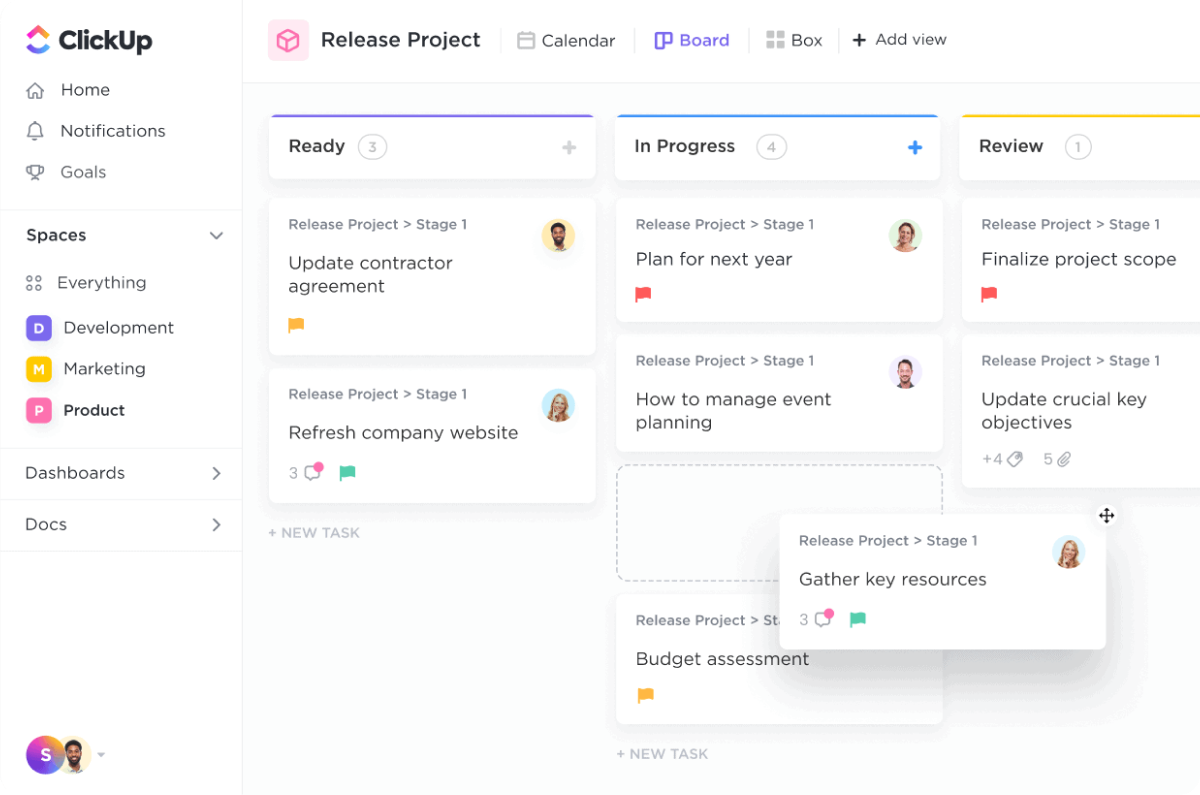
Source: ClickUp
You might’ve heard of ClickUp before. It’s a very popular work management tool that helps teams keep their project workflows organized via features like task planning, goal setting, and dashboards.
Customizability is one of ClickUp’s biggest selling points. The tool offers an overwhelming number of capabilities, including dozens of different integrations. These allow your team to use the tool in whatever way works best for your organization.
ClickUp popular features
- Multiple project views
- Tasks
- Whiteboards
- Team chats
ClickUp weaknesses
Sometimes, tools with too many capabilities can cause frustration and unnecessary complexity. Unfortunately, some users have found this to be true with ClickUp. And unless you’ve purchased a pricy enterprise plan that includes live onboarding support, then you should be prepared to tackle ClickUp’s learning curve on your own.
ClickUp pricing
- Free forever plan
- Unlimited plan: $10 per user/month
- Business plan: $19 per user/month
- Enterprise plan: Pricing upon request
8. Clockify
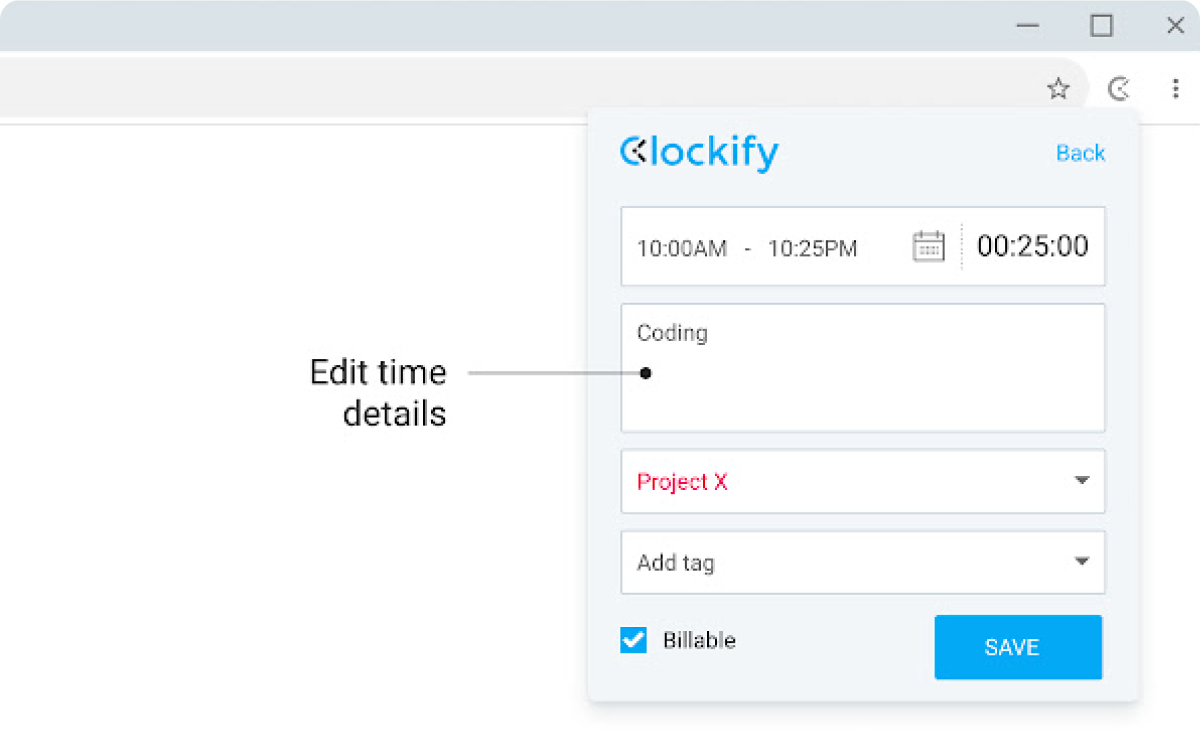
Source: Clockify
Clockify is a time management app with a simple interface. The tool is designed to help employees clock in and out of their shifts, track breaks, and visualize their time blocks on a calendar.
Another benefit of Clockify is the way your time tracking data can be synced across devices. So, if you record hours using Clockify’s mobile app, it should be instantly visible on its web and mobile apps.
Clockify popular features
- Timesheets
- Reporting dashboard
- Expense tracking
- Team management
Clockify weaknesses
Although Clockify markets itself as a free time tracker, many important features remain behind a paywall for its paid plans — a common complaint among online reviewers. Additionally, some say Clockify’s reporting features aren’t nearly as robust as some teams need them to be.
Clockify pricing
- Free plan
- Basic plan: $4.99 per user/month
- Standard plan: $6.99 per user/month
- Pro plan: $9.99 per user/month
- Enterprise plan: $14.99 per user/month
9. DeskTime
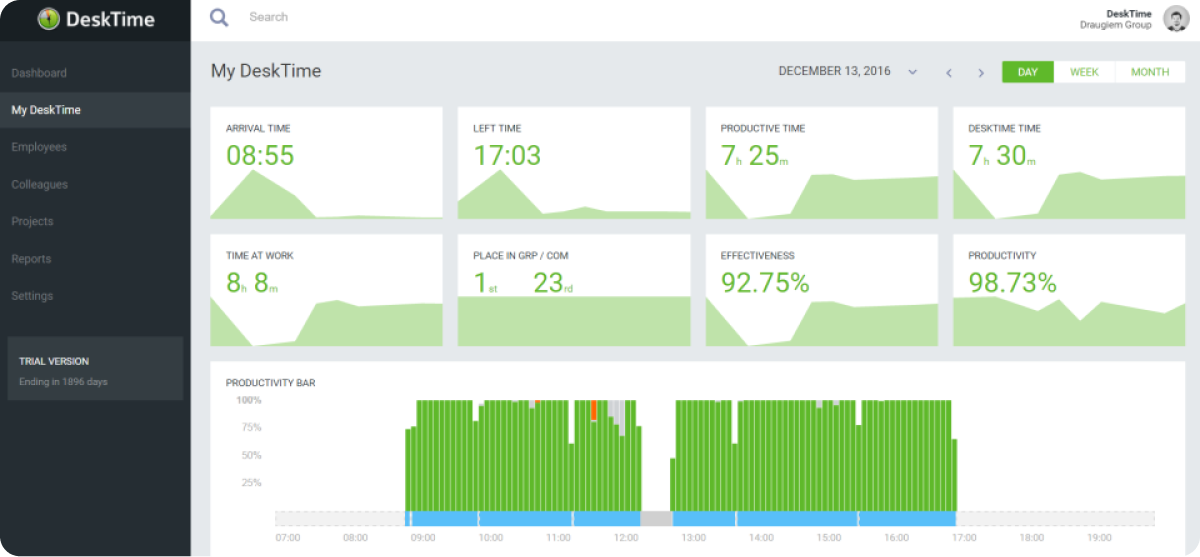
Source: DeskTime
DeskTime is a helpful tool for time and activity tracking. Additional features like performance evaluation and reporting also make it a great tool for lightweight project management as well. Plus, the tool is customizable, meaning you can toggle certain features on or off depending on what your team needs.
Similar to tools like Time Doctor, DeskTime also offers employee monitoring features. This includes things like screenshots of employees’ screens to ensure they’re staying on task, and personalized user dashboards to show employers how each team member is spending their time.
DeskTime popular features
- Time tracking
- Performance evaluation
- Reporting
- Scheduling
DeskTime weaknesses
Aside from invasion of privacy concerns that might arise from its employee monitoring features, online reviewers also claim the tool struggles with glitches and lags. For example, some say downloading reports can take too long, and the task timer may stop even when your computer goes idle for just a couple of minutes.
DeskTime pricing
- DeskTime Lite: Free for 1 user
- Pro plan: $7 per user/month
- Premium plan: $10 per user/month
- Enterprise plan: $20 per user/month
10. Timely
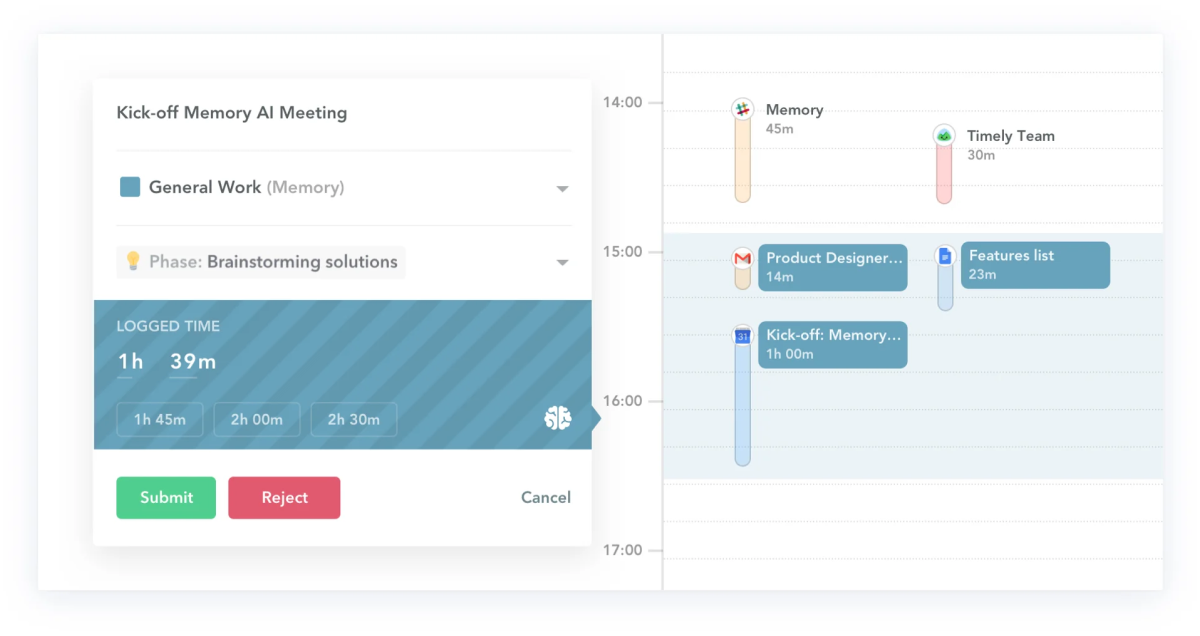
Source: Timely
Timely excels in helping teams track their time, projects, and team members. However, unlike other TimeCamp alternatives, Timely has a strict anti-surveillance policy, meaning the tool doesn’t offer employee monitoring features like screenshots or keystroke monitoring.
So, if you’re looking for extensive productivity monitoring features, this isn’t the right tool. But, if you’re looking for a solution that attempts to balance time and project management, Timely might be worth checking out.
Timely popular features
- Automated time tracking
- Task scheduling
- Capacity planning
Timely weaknesses
Online reviewers say that while the tool has a growing number of features, some of these features often lack basic functionality. Some also say they haven’t seen many improvements even after sharing this feedback with the Timely team.
Timely pricing
- Starter plan: $11 per user/month (max 5 users and 20 projects)
- Premium plan: $20 per user/month (max 50 users)
- Unlimited plan: $28 per user/month
- Tasks are available as an add-on for $5 per user/month.
11. Wrike
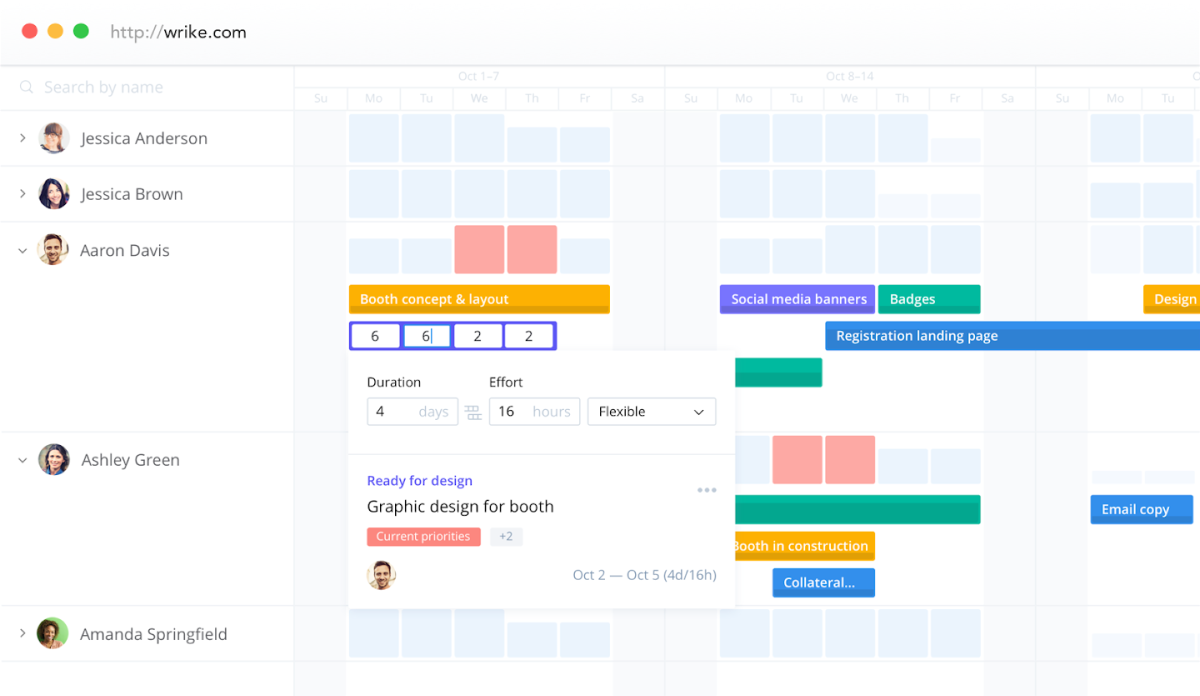
Source: Wrike
If you’re only considering project management software tools that are all in one, then Wrike might be a contender for your team. The platform doesn’t heavily rely on integrations to help your team get their work done.
The tool also isn’t limited to teams in a particular industry, as creative agencies, marketing teams, and consulting teams can all use Wrike.
Wrike popular features
- Dashboards
- Proofing
- Resource planning
- Gantt charts
- Kanban boards
Wrike weaknesses
Some teams find Wrike’s collaboration features to be somewhat limited, which might be a drawback for teams that are fully remote and rely on their main work management system to keep connected.
Wrike pricing
- Free plan
- Team plan: $9.80 per user/month
- Business plan: $24.80 per user/month
- Enterprise plan: Pricing upon request
- Pinnacle plan: Pricing upon request
12. RescueTime
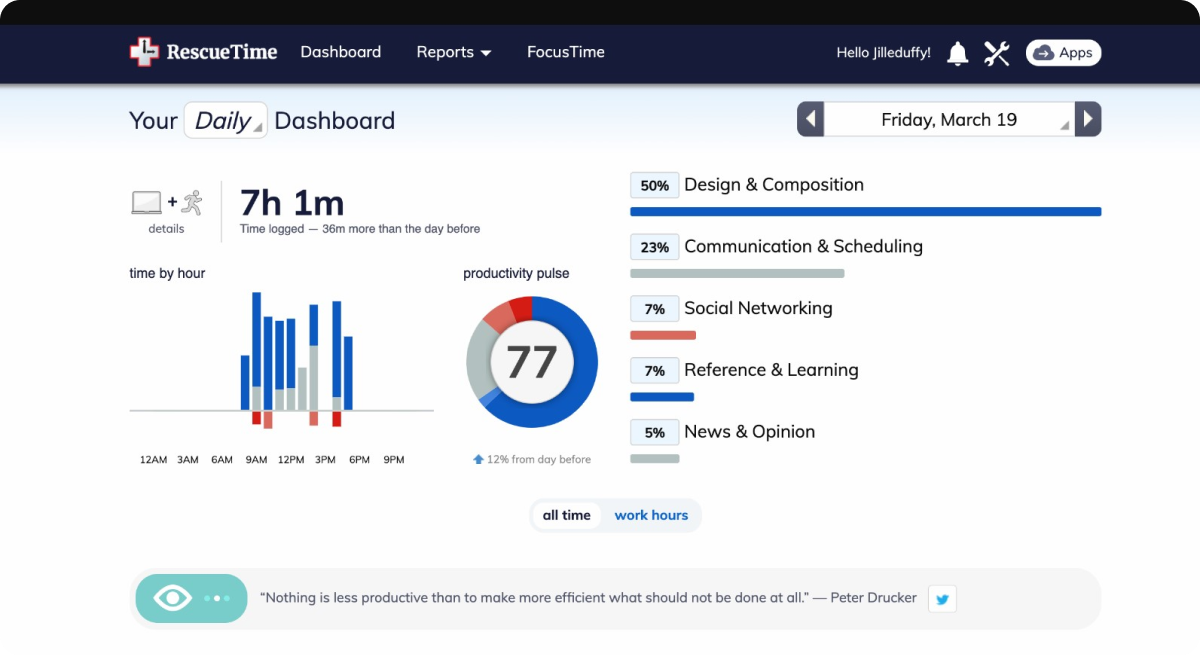
Source: RescueTime
As a TimeCamp alternative, RescueTime attempts to differentiate itself from other time management software solutions with its unique approach to distractions.
The tool does this by allowing admin users to block team members from accessing websites and other apps that are distracting. Users can also set up distraction alerts to keep everyone on task.
RescueTime has also recently begun integrating AI into its platform, with its beta AI tool automatically dividing logged time between various projects and clients.
RescueTime popular features
- Distraction blocking and alerts
- Automatic time tracking
- AI assistance
RescueTime weaknesses
Some users have reported that RescueTime’s user interface is not properly optimized for a smooth user experience. And if your team needs more than timesheets and productivity optimization, you’ll need to pair another tool alongside RescueTime for full-scale project management.
RescueTime pricing
- Lite plan: Free
- Premium plan: $12 per user/month
13. Hubstaff
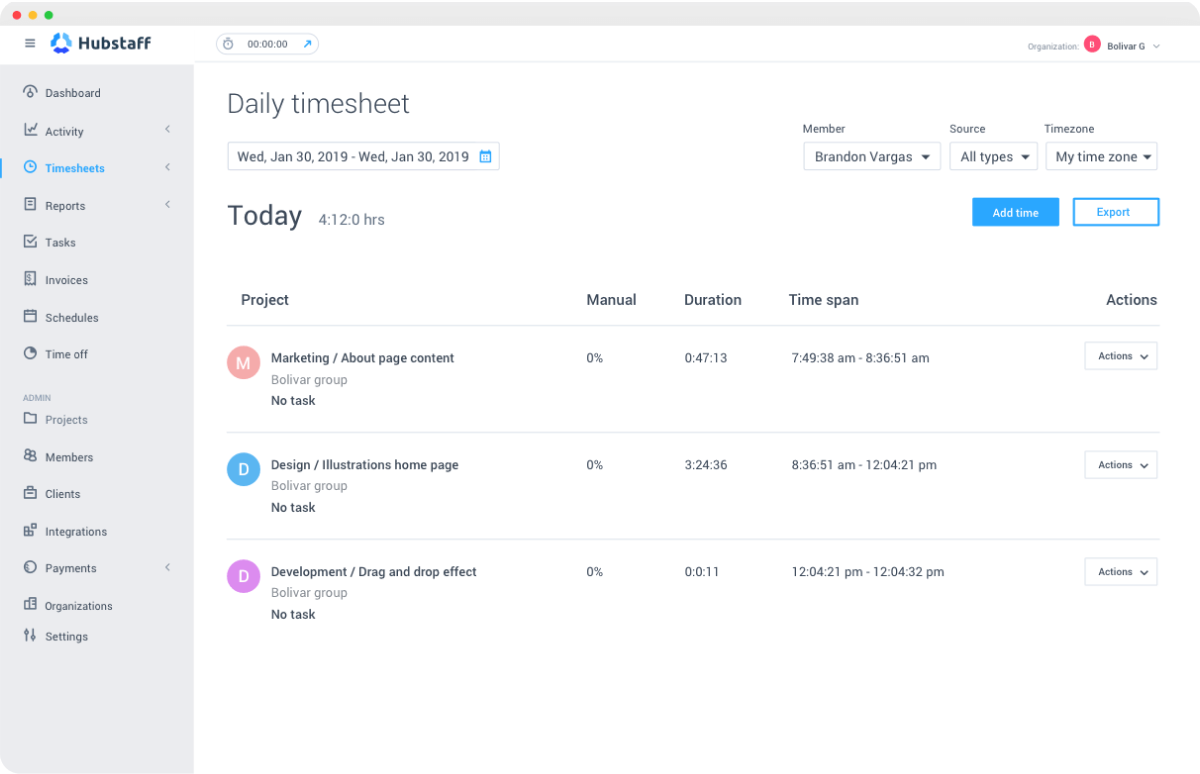
Source: Hubstaff
Hubstaff is a time and productivity software solution that helps monitor employee activities and productivity. You’ll need to use another tool if you want a robust project management tool.
That said, Hubstaff also offers a separate product — Hubstaff Tasks — which you can purchase separately and integrate for a solution that involves task planning.
Hubstaff popular features
- Employee timesheets
- Geofencing employee tracking
- Mobile clock app
- Time reports
Hubstaff weaknesses
Aside from its sometimes difficult-to-navigate interface, online reviewers on sites like G2 and Capterra have said that Hubstaff can be distracting. This is because the app sends notifications every time employees start or stop working, take breaks, or switch tasks.
Hubstaff pricing
- Free plan (1 user only)
- Starter plan: $7 per user/month
- Grow plan: $9 per user/month
- Team plan: $12 per user/month
- Enterprise plan: $25 per user/month
- Note: Paid plans require a minimum of 2 users
14. Everhour
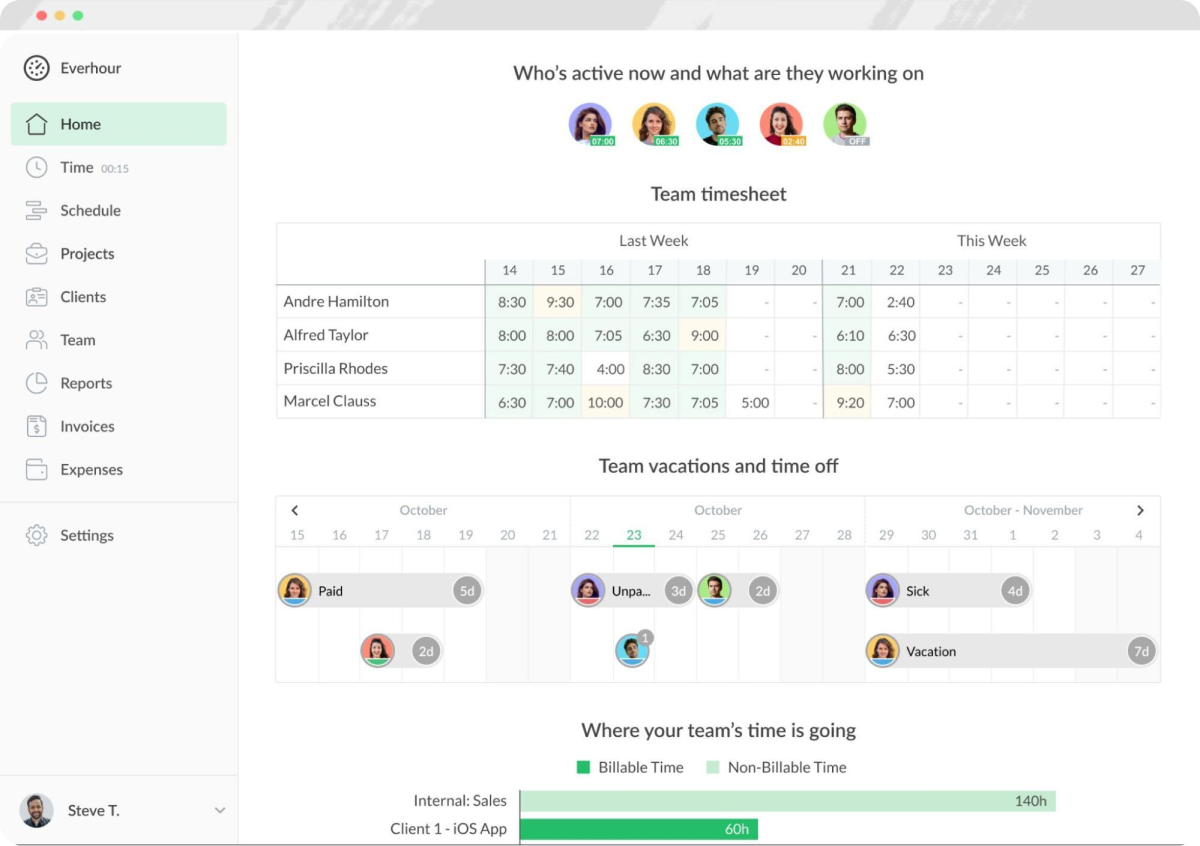
Source: Everhour
Everhour is a time-tracking software system built specifically for budgeting, client invoicing, and payroll. As such, it might be a solid choice for teams tracking time primarily for financial purposes rather than for productivity measurement.
But, you’ll only be able to oversee specific project tasks with a software integration. Everhour does offer a free Trello power-up that enables you to combine the functionality of both tools.
Everhour popular features
- Time tracking
- Billing and budgeting
- Employee scheduling
- Expense tracking
- Screenshots of freelancers’ work
Everhour weaknesses
Everhour does offer detailed reports, although some users don’t find them user-friendly enough and have experienced a lag when trying to access them. It also doesn’t have the same employee monitoring features that some other TimeCamp alternatives have, which may be a weakness if that’s a priority for your team.
Everhour pricing
- Free plan (up to 5 users)
- Team plan: $10 per user/month (5 user minimum)
15. Runrun.it
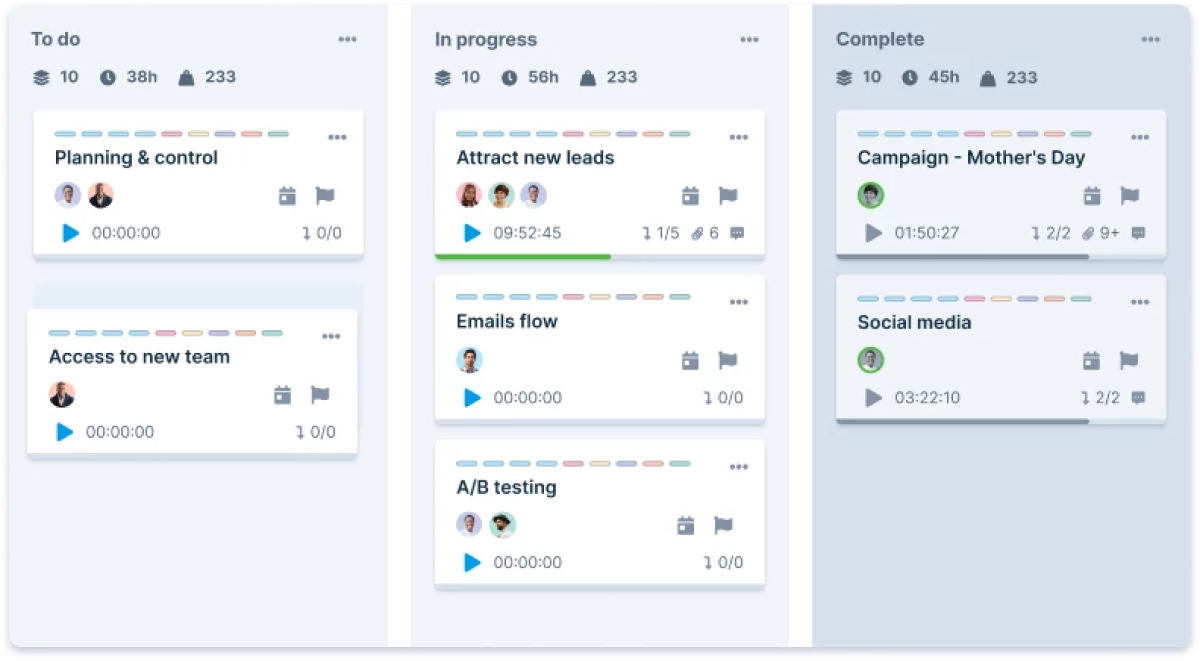
Source: Runrun.it
Runrun.it positions itself as a work management platform that HR, marketing, support, and IT teams can use. The tool strives to be an all-in-one software solution.
The platform allows project managers to keep their team’s tasks straight through its smart boards feature, which are equipped with automations. Other key features include Runrun.it’s custom forms and team chats to keep information centralized.
Runrun.it popular features
- Smart boards for task management
- Automations
- Team chats
- Custom forms
Runrun.it weaknesses
Although Runrun.it does offer time tracking, this feature may not be as robust as TimeCamp or some of the other alternatives on this list. The platform offers a “smart time tracking” feature in which timesheets are automatically generated, but this is the extent of Runrun.it’s time management.
Runrun.it pricing
- Free plan (up to 5 users)
- Business plan: $10 per user/month
- Enterprise plan: $25 per user/month
16. QuickBooks Time
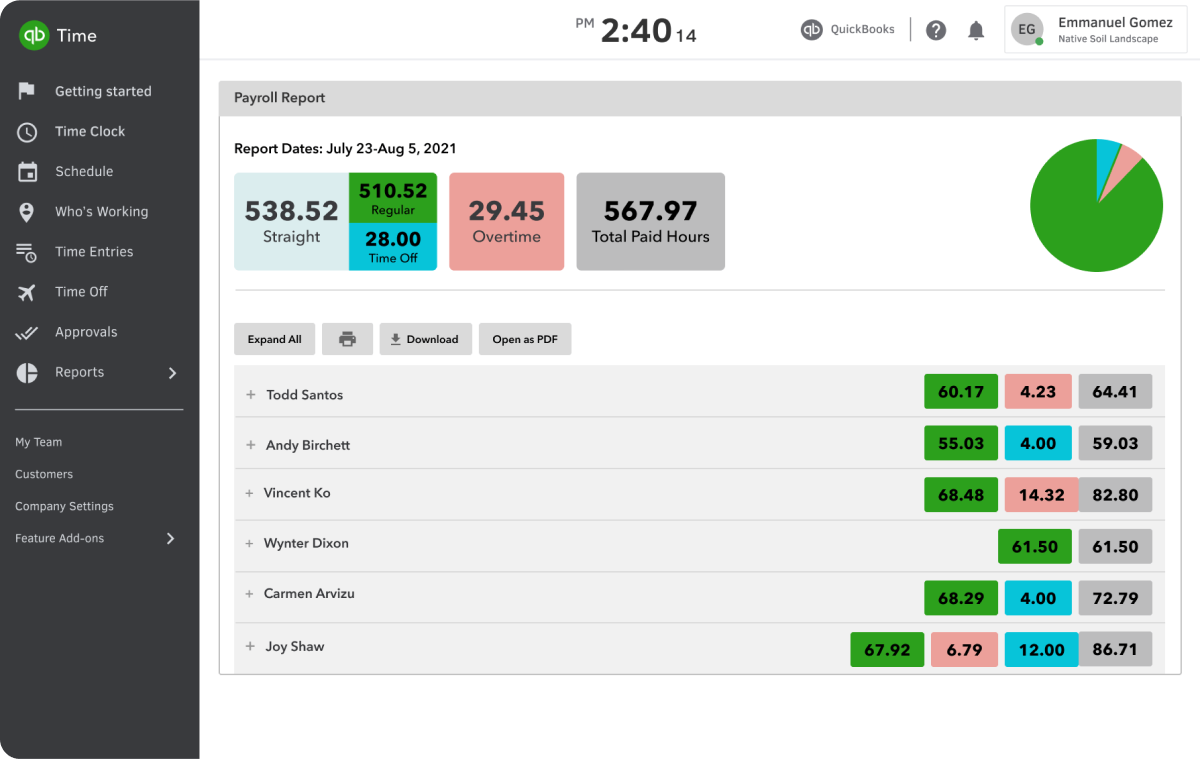
Source: QuickBooks Time
QuickBooks is known for its extremely popular accounting product. But the company also offers QuickBooks Time — a software solution built for easy time and employee management.
Aside from time tracking, QuickBooks Time makes it easy for employees to clock in and out and monitor their shifts using geofencing. This might be a fit for teams that do a lot of their work in the field or on the go.
QuickBooks Time popular features
- Geofencing
- Attendance tracking
- Invoicing
- Dashboards
QuickBooks Time weaknesses
Time management is the only use case for QuickBooks Time. This means that teams looking for a solution that has project management capabilities will need to look into third-party integrations to get the features they need.
QuickBooks Time pricing
- Premium plan: $20 per month for admin license, +$8 per user/month
- Elite plan: $40 per month for admin license, +$10 per user/month
Takeaway
There you have it! That’s our list of the top 15 TimeCamp alternatives on the market in 2024. Ultimately, the right software solution for your team will depend on your exact project needs.
For instance, if employee monitoring is a top priority for you when time tracking, you’ll want to look into Time Doctor. But, if you prefer to adopt an anti-surveillance approach while still recording your team’s billable hours, then consider looking into Timely.
That said, many TimeCamp alternatives fall short of offering comprehensive project management support. If you’re looking for a solution that incorporates the financial health of projects in addition to time management, you’ll want to check out Rodeo Drive.
The best part is, it’s completely free to come see Rodeo Drive for yourself. Sign up today! You won’t even need to enter your credit card information.






